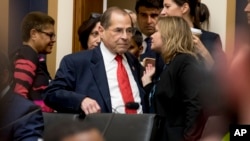The Democratic-led U.S. House of Representatives Judiciary Committee said on Monday it will consider steps this week to formalize an investigation that could lead to the impeachment of President Donald Trump.
The panel, which hopes to decide whether to recommend Trump's impeachment to the full House by year-end, will meet on Thursday to consider a resolution that Democratic panel aides said would better align the inquiry with formal ones of the past.
House Democrats have broadly ramped up investigation of Trump as they returned from summer recess on Monday and unveiled an inquiry into reports that he pressured Ukraine's government into assisting his re-election campaign.
The measure to be considered at 8 a.m. EDT (1200 GMT) on Thursday would authorize panel Chairman Jerrold Nadler to designate committee and subcommittee hearings as impeachment proceedings.
It would also allow for aggressive questioning of hearing witnesses by committee attorneys, set procedures for reviewing grand jury material and allow the White House to respond in writing to evidence and testimony.
"Hopefully, it enables us to move more quickly and more effectively," Nadler told reporters. "We are examining the various malfeasances of the president with a view toward the possibility of recommending articles of impeachment."
Only two American presidents have been impeached by the House: Andrew Johnson in 1868 and Bill Clinton in 1999. Neither was convicted by the Senate, which is required to remove a president.
Former President Richard Nixon resigned in 1974 after the House Judiciary Committee approved articles of impeachment against him, but before the full House voted on the matter.
An impeachment resolution against Trump was referred to the judiciary committee in February, three months after Democrats won control of the House in November 2018. It launched an oversight probe of Trump's presidency in March and has since rebranded it as an impeachment investigation.
But the approach has been criticized by Republicans for avoiding a precedent from the Nixon and Clinton eras, when formal impeachment inquiries were authorized by the full House.
This time, Democrats have steered clear of a House vote that could prove risky for Democratic freshmen from swing districts, where impeachment is unpopular with many voters.
"Judiciary Democrats are trying to pull a fast one on Americans," Representative Doug Collins, the panel's top Republican, said in a message on Twitter.
At least 134 House Democrats support an impeachment inquiry, a Reuters head count shows. While that is a majority of the party caucus, the number is well below the 218 votes needed for the House to approve a resolution.
A Democratic aide said the new steps follow procedures used in previous impeachments. But the resolution would not go to the full House for a vote.
For much of the year, the panel has focused on former Special Counsel Robert Mueller's investigation into Russian meddling in the 2016 presidential election, including instances of Trump behavior that Democrats say provide evidence he obstructed justice by trying to impede Mueller's inquiry.
Nadler has since broadened the investigation to other kinds of potential misconduct, including accusations that Trump has improperly mixed his business interests with his role as president, dangled pardons to encourage official misconduct and paid money during the 2016 campaign to silence women claiming to have had affairs with him.
The panel has also sued in federal court to gain access to Mueller's grand jury evidence and to compel former White House Counsel Don McGahn to testify.
If the committee approves the new resolution on Thursday, the more aggressive questioning format would be in place for a Sept. 17 hearing where Trump's former campaign manager, Corey Lewandowski, is scheduled to testify, along with former Trump White House aides Rob Porter and Rick Dearborn.
Democrats want to question the three men about an episode described by Mueller, in which Trump allegedly tried to pressure former Attorney General Jeff Sessions to redirect the Russia probe away from his 2016 presidential campaign.
But it is not clear whether the White House could seek to stonewall the hearing by directing Porter and Dearborn not to testify.
Lewandowski has said he intends to appear.





